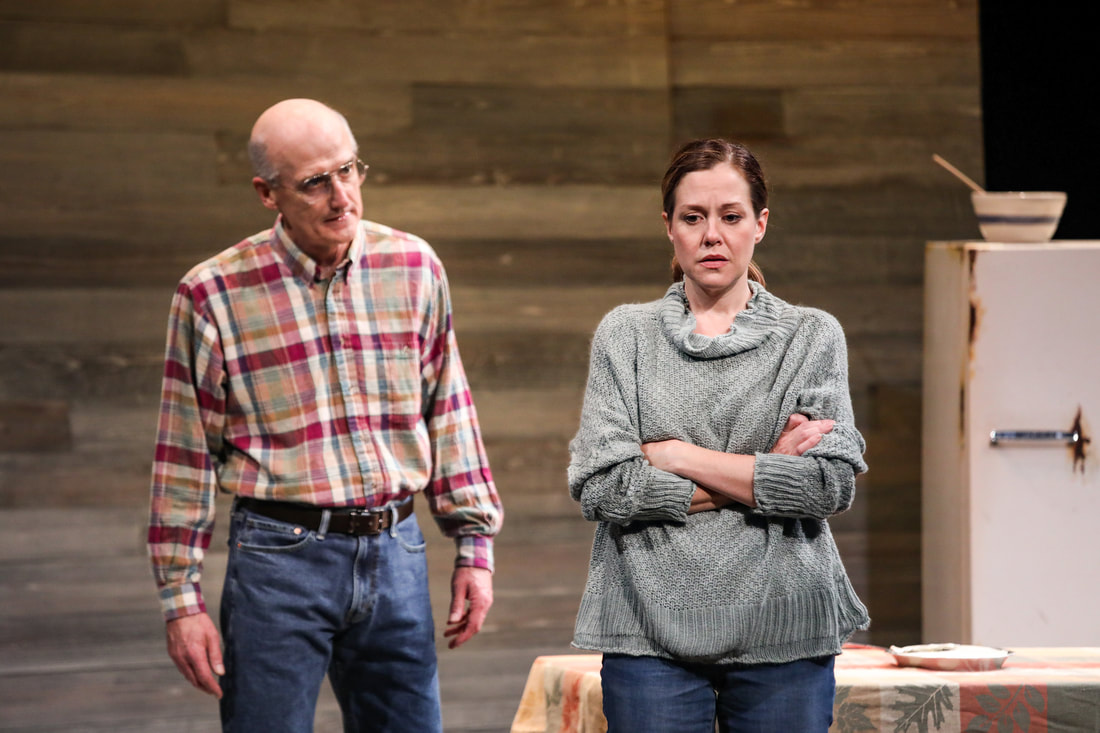|
Ray Dooley as Henry and Claire Karpen as Allie in Dairyland by Heidi Armbuster, directed by Vivienne Benesch. HuthPhoto. PlayMakers' world premiere of Dairyland, a new play by Heidi Armbruster, opens on young-ish Allie (Claire Karpen) on a tense first date. Described by said date as "scrappy" and definitely qualifying as spunky, Karpen's characterization of Allie makes her instantly likeable, which is helpful for the many character flaws that will be presented later in the script.
Allie, a food writer, quickly reveals herself as someone who has developed a cynical view on her profession and on the nature of food and where it comes from. Having been born but not quite bred on a farm, Allie has difficulty falling in line with the "sustainability" and "organic" rhetoric of her peers. Following her disastrous date and an even more disastrous encounter with her ex, Declan, charmingly but devilishly portrayed by Khalil LeSaldo, Allie sets out on a mission to prove that these terms don't mean as much as we think they mean . Armbruster's mostly smart script, directed here by the talented Vivienne Benesch, who has a clear gift for comedic timing and onstage movement, soon begins to play with the parallels between nature/food/farming and the hypocritical, often jumbled, and oft-misunderstood lives that humans live. These connections are illustrated beautifully by a large screen that plays a documentary on cows and using them for show, milk, and food. Benesch allows her "Allie" to dress and undress onstage through effective, fast costuming changes, but unfortunately, the transition from first to second act is not nearly as smooth and effective. Feeling somewhat disjointed, the second act sees Allie heading back home to repair a relationship with her distant father, Henry, fabulously portrayed by a gruff but loveable and entirely endearing Ray Dooley in his 100th production with PlayMakers. The second act is a full story in its own right, one about what it means to stand out versus being authentic and about how people cannot find themselves or be their true selves without acknowledging and embracing their pasts. It's about how to "pull out something alive" from oneself. And, while the message rings clear, it doesn't quite jive with the first act's dabbling with class, economics, and criticisms surrounding the constructs of the western world. In fact, it almost feels as though the second act, aside from establishing character, could stand apart from the rest. Despite flaws in Armbruster's writing, which merely feels unfinished rather than incompetent, a strong cast and smart staging- often featuring estranged Allie and Henry literally crossing paths and coming to a standstill- the show is still intriguing. These are characters worth caring about. And, thanks largely to Dooley and Karpen's strong characterizations, the relationship between father and daughter stands out as beautifully real and flawed, easily one of the most enjoyable and authentic parts of this script. Ultimately, the production does hold attention from beginning to end, and it's beautifully produced and directed. However, there seems to be strands missing here. And, while, to some degree, these missing strands do give viewers much to think about, one can't help but feel like the script, with just a bit more tweaking and thought, could stand out as more memorable. Still, PlayMakers deserves major kudos for its willingness to produce new plays, especially non-musicals. Rapidly becoming one of the few true Triangle options to do so, PlayMakers' production is worth seeing just for its freshness and for the beautiful quality of real, raw theatre.
0 Comments
|
TAR
We love the arts. We write about them. Founded 2018. Categories
All
Archives
January 2024
|


 RSS Feed
RSS Feed